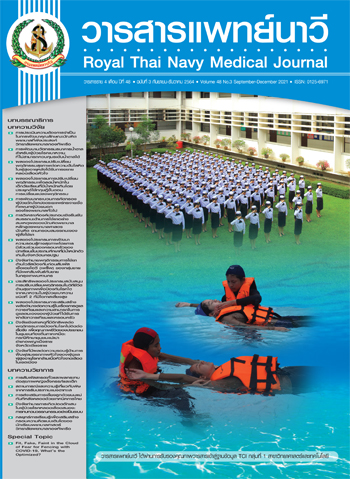The Needs Assessment for Development of Desired Characteristics of Graduate Nurses, The Royal Thai Navy College of Nursing
Main Article Content
Abstract
The purposes of this research were to examine the desirable and present status of the graduates’ attributes of The Royal Thai Navy College of Nursing, as well as to undertake the needs assessment for graduates' ideal attributes. The 326 research samples included 29 nursing instructors, 30 employers purposively selected, 157 nursing students from 1st - 4th year, and 110 graduates from 2017 - 2019 academic year obtained from stratified random sampling. The research instrument was a dual response with 5-point scale needs assessment questionnaires for graduate nurse desired characteristics which were employed and tested for reliability, yielding 0.98 and 0.93 for the desirable and current questions, respectively. The descriptive statistic as well as the Priority Needs Indexes (PNIModified) were examined.
The findings indicated the following:
- The ideal attributes were all at the highest level (Mean = 4.71, SD = 0.30) also their compositions. In accordance with the attributes, moral, ethical, legal, and practical abilities were all at the highest level (Mean = 4.78, SD = 0.31 and Mean = 4.78, SD = 0.37, respectively), followed by the professional and military characteristics (Mean = 4.72, SD = 0.39) but the arithmetic, communication, and ICT were at the lowest level (Mean = 4.64, SD = 0.40).
- The current state of graduates' attributes in total was high (Mean = 3.94, SD = 0.45) and their compositions were similar, as well as their current attributes in moral, ethical, legal, and practical abilities, which were all at the highest level simultaneously (Mean = 4.05, SD = 0.51 and Mean = 4.05, SD = 0.56, respectively), followed by the professional and military characteristics (Mean = 4.01, SD = 0.57), while academic was at the lowest level (Mean = 3.77, SD = 0.57).
- The overall Priority Needs Index (PNIModified) for the development of the graduates' ideal attributes was 0.20, with academic skills ranking first (PNIModified = 0.24), followed by cognitive and research (PNIModified = 0.22), arithmetic, communications, and ICT (PNIModified = 0.20), interpersonal relationship (PNIModified = 0.19), moral, ethical, and legal (PNIModified = 0.18), practical skill (PNIModified = 0.18), and professional and military attributes (PNIModified = 0.18).
Article Details

This work is licensed under a Creative Commons Attribution-NonCommercial-NoDerivatives 4.0 International License.
References
Roongruangsri S, Sanluang CS. Introduction to nursing and midwifery profession. Chiangmai: Smart Coating and Services; 2018. (in Thai).
Office of the Higher Education Commission, Ministry of Education. Announcement of the Ministry of Education: qualification standard for bachelor’s degree in nursing B.E. 2560. [Internet]. [cited 2021 January 10]. Available from: https://www.tnmc.or.th/images/userfiles/files/Edit(1).PDF. (in Thai).
Thailand Nursing and Midwifery Nursing. Competencies of registered nurses. Nonthaburi: Siriyod Printing; 2010. (in Thai).
Sutthirat C. Curriculum development: theory to practice. 2nd ed. Bangkok: V.Print (1991); 2014. (in Thai).
Wongwanich S. Needs assessment research. 3rd ed. Bangkok: V.Print (1991); 2015. (in Thai).
The Royal Thai Navy College of Nursing. Bachelor of nursing science program (revised curriculum 2018). Bangkok: Royal Thai Navy College of Nursing, Naval Medical Department. (in Thai).
Srisatidnarakul B. The methodolody in nursing research. 5th ed. Bangkok: U & I Inter Media; 2010. (in Thai).
Narmkul P. Factors affecting to desirable characteristics in morality and ethics of nursing students, Faculty of Nursing, Ubon Ratchathani Rajabhat. Journal of Srivanalai Vijai 2018;8(2):27-38. (in Thai).
Dhabdhimsri V, Kemkhan P, Vanich W, Huengwattanakul P. The desired characteristics of graduate for Thailand qualifications framework and Identities of graduates in bachelor of nursing science program from Boromarajonani College of Nursing, Bangkok as Perceived by their Supervisors. Journal of Boromarajonani College of Nursing, Bangkok 2019;35(1):252-63. (in Thai).
Khonhkhoontot P, Jarupisitpaiboon C, Gaewgoontol N, Pramasawat N, Pha-Ngam M. Opinions of stakeholders on the qualities and identities of novice nurses graduated from Boromarajonani College of Nursing, Nakhon Ratchasima in the Academic Year 2018. Journal of Health Science 2020;29(6):1086-94. (in Thai).
The Royal Thai Navy College of Nursing. Bachelor of nursing science program (revised curriculum (2012). Bangkok: Royal Thai Navy College of Nursing, Naval Medical Department. (in Thai).
Somsap Y, Varee A. Thai nurse brand in 21st century: challenges for nursing profession. Songklanagarind Journal of Nursing 2019;39(3):169-78. (in Thai).
Visudtibhan PJ, Disorntatiwa P. Learning style preferences of nursing students at Ramathibodi School of Nursing, Faculty of Medicine, Ramathibodi Hospital, Mahidol University. Nursing Journal of the Ministry of Public Health 2015;25(1):70-82. (in Thai).
The Subcommittee on Policy Iissue 4. Draft policy on policy issue 4 under the topic “research and innovation in nursing education”. In: Proceedings of the 6th National Academic Conference in Nursing Education: transforming nursing education in a changing healthcare system: policy recommendations; August 13 – 14, 2021. Virtual Conference. (in Thai).
Planning and Research Division. Strategic plan of the Royal Thai Navy College of Nursing 2020 - 2523. Bangkok: Royal Thai Navy College of Nursing, Naval Medical Department. (in Thai).


